Analysis
Congress has collectively spent 94 years fundraising since 2015
Since 2015, our elected leaders have had to spend hours fundraising, instead of doing their jobs. One of the biggest problems with our campaign finance system is that the…
Analysis
In the 2024 elections, democracy felt less like a shared experience and more like a multiverse — a realm where different realities collided and coexisted, often with jarring contrast. For some voters, democracy was under siege, with election integrity threatened by “dark money,” false information, and divisive political rhetoric. Each side lives in a distinct reality, shaped by tailored information ecosystems, and information consumption patterns impacting realities. While half of voters cited “democracy” as their top voting motivation, democracy is an abstract concept politicized by the campaigns. The election unfolded under a cloud of record-breaking spending, with $20 billion pouring into state and federal races, including over $1 billion in dark money from undisclosed sources.
Adding to the surrealism were waves of false information, amplified not only by partisan networks but by sophisticated foreign interference. Russia, China, and Iran spread false narratives through social media and even fabricated FBI warnings, all aiming to erode trust and fuel chaos. Nearly 73% of Americans reported seeing misleading election coverage regularly, contributing to the deep divides and subjective realities voters navigated.
As the dust settles from the 2024 election, America’s sociopolitical fabric is as fragmented as ever, with citizens navigating a political multiverse that defies shared reality. In this multiverse, perspectives shaped by tailored media ecosystems continue to diverge — where for some, the election processes held steady under record participation and reform, while for others, it stood vulnerable to misinformation, dark money, and manipulation.
For democracy to thrive beyond this polarized landscape, it must move from a virtual space of divided realities to a shared foundation rooted in trust and accountability. Achieving this means finding ways to bridge the informational gaps that reinforce these realities. As Americans look to future elections, the goal will be to reunify the multiverse of democracy into a more cohesive, common experience where, despite differences, voters can share in a genuine confidence in the systems that shape their nation’s future.
AP VoteCast, conducted by NORC at the University of Chicago, found that half of voters identified democracy as the single most important motivating factor for their vote in the 2024 election. However, the term democracy, which is an abstract concept for the public, has become politicized and has taken on different meanings and salience to different constituencies. During the 2024 election cycle, both presidential campaigns spoke about the other candidate in terms of being a threat to democracy. According to the AP VoteCast survey, 9 in 10 Harris voters who indicated democracy was the single most important factor in their vote were somewhat or very concerned that electing Trump would bring the country closer to authoritarianism. About 8 in 10 Trump voters felt electing Harris would bring the country closer to authoritarianism. Thus, what constitutes a threat to democracy can vary based on perceptions.
In addition to candidate and campaign statements, information consumption patterns impact voters’ perceptions and beliefs. Media sources are significantly correlated with vote choice. And in a fractured information ecosystem, the information sources that voters consumed impacted both their views and their vote choice. A survey by IPSOS found that viewers of Fox News or conservative media outlets like Breitbart and Newsmax were most likely to say that the main issue to impact the election was immigration. Meanwhile, cable news or national newspaper consumers, said it was political extremism and threats to democracy.
To gain better insights into public perceptions of democracy, Issue One fielded a pre-election national survey in September with GQR and Red Bud Consulting. In an open-ended question asking what democracy means to them, we found that respondents were most likely to indicate that democracy is about ensuring freedoms and rights, followed by a free and fair electoral process and representation, and self-governance.
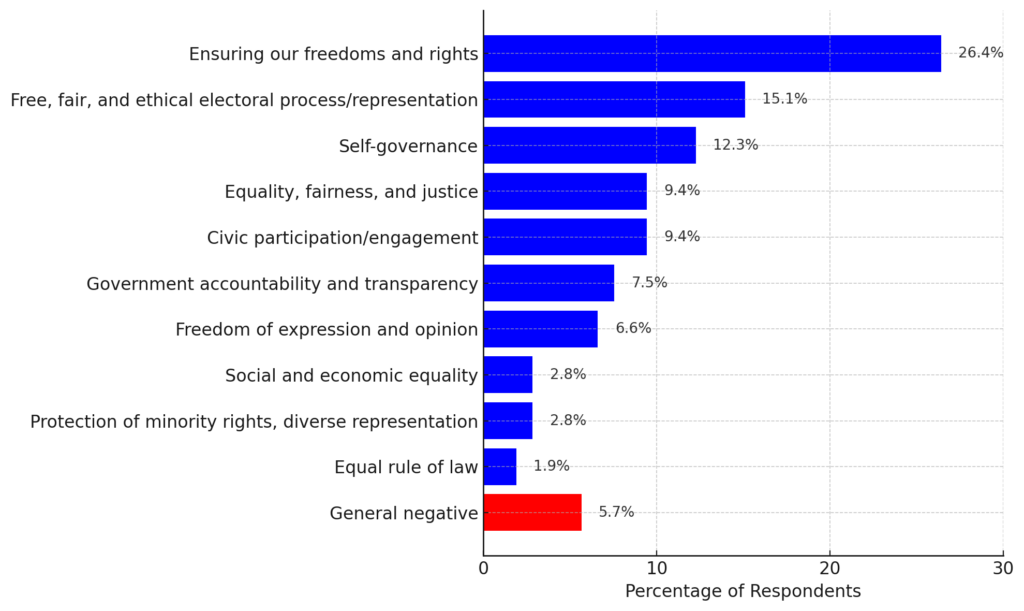
Respondents also indicated that the system needs improvement. While respondents generally expressed satisfaction with how democracy and our electoral system are working, people DO NOT feel that the government is responsive to or representative of their needs.
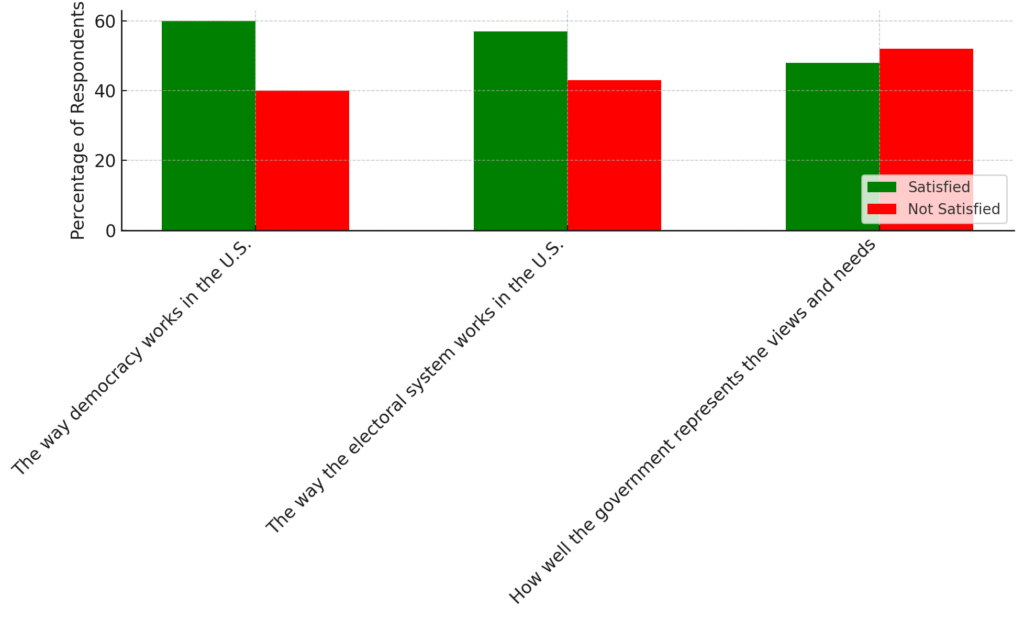
In addition, respondents told us that businesses and corporations, lobbyists, and wealthy donors have too much influence on the government.
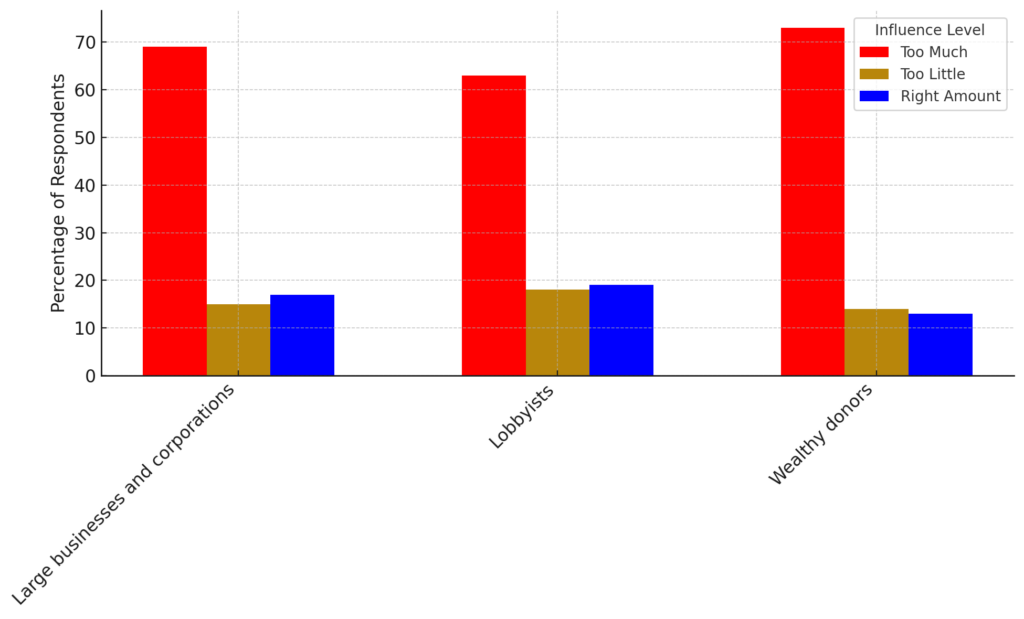
Pew Research Center has found that the public is most likely to say that democracy can be improved with better or different politicians, with an emphasis on responsiveness and representation. People express a desire for more ordinary citizens to be able to serve in politics and call for more young people and women to serve, as well as for fewer wealthy people in government. People also express that politicians should be of higher quality, possessing competence, knowledge, and expertise in key policy issues.
Elections as a process and act of democracy functioned well in 2024, even in spite of all the challenges, including: a constant flow of false information; increased threats, including more than 60 bomb threat hoaxes that disrupted but did not shut down voting on Election Day; increased threats, harassment, and intimidation of election officials and workers; and foreign malign influence and interference aimed at sowing division and chaos and undermining public confidence in democratic institutions. Despite the challenges, a majority of Americans expressed confidence that the 2024 presidential election was held fairly, according to Economist/YouGov survey conducted November 6-7, 2024.
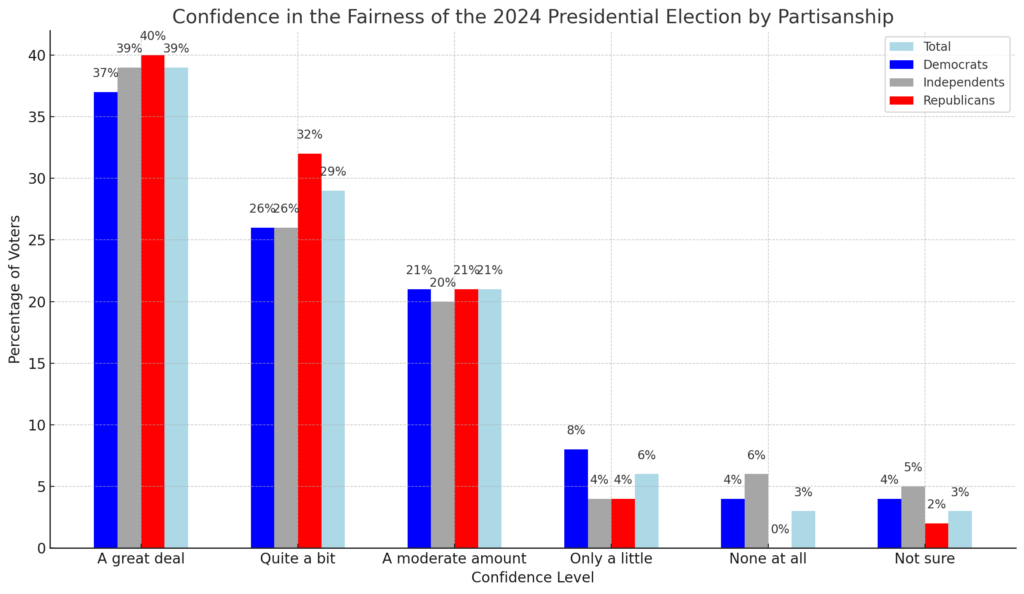
And compared to 2020, Americans are more likely to view the 2024 election as legitimate and accurate according to an Ipsos survey fielded during the last week of voting. The increase in perceptions of legitimacy were by Republicans (only 26% in 2020 vs. 91% in 2024) and independents (55% in 2020 vs. 74% in 2024). Meanwhile the percentage of Democrats viewing the election as legitimate and accurate declined from 88% in 2020 to 63% in 2024, suggesting that confidence is determined by the fate of a partisan’s preferred candidate.
On the election administration front, there were some technical hiccups and some jurisdictions continue to experience long waiting periods. However, overall, the election was smooth and secure and a reminder that America does elections well, especially thanks to the professionalism of thousands of public servants who serve their communities by administering elections. While vote counting continues in some closely competitive contests, election officials took action to ensure the process was smoother in 2024 than 2020. Based on survey data from Economist/YouGov, only 4% of voters had to wait to vote more than an hour in person, while 84% of voters reported waiting 30 minutes or less.
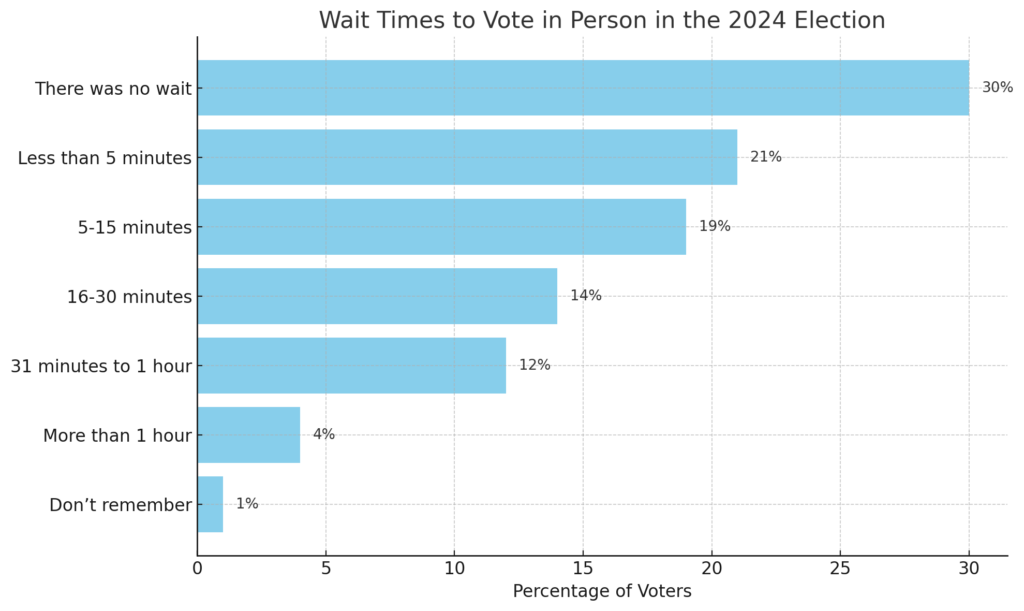
Data Source: Economist/YouGov
Voter turnout in the 2024 election also remained relatively high, with about 65% of the Voting Eligible Population casting a ballot, according to data from the University of Florida’s Election Lab. For comparison, an historic high of 67% of the voting-eligible population turned out to vote in the 2020 presidential election. States that were more competitive and critical to the Electoral College outcome experienced higher voter turnout in 2024 relative to 2020.
The 2024 election shattered spending records, with an estimated $20 billion directed toward state and federal races, including approximately $16 billion for federal campaigns and $4.6 billion raised by state candidates, party committees, and ballot initiatives (a record $1.4 billion), according to analysis by OpenSecrets. Notably, independent groups like super PACs contributed over $4.5 billion through independent expenditures on ads and mailers. OpenSecrets also found that dark money from anonymous sources accounted for over $1 billion in total contributions to independent groups like super PACs.
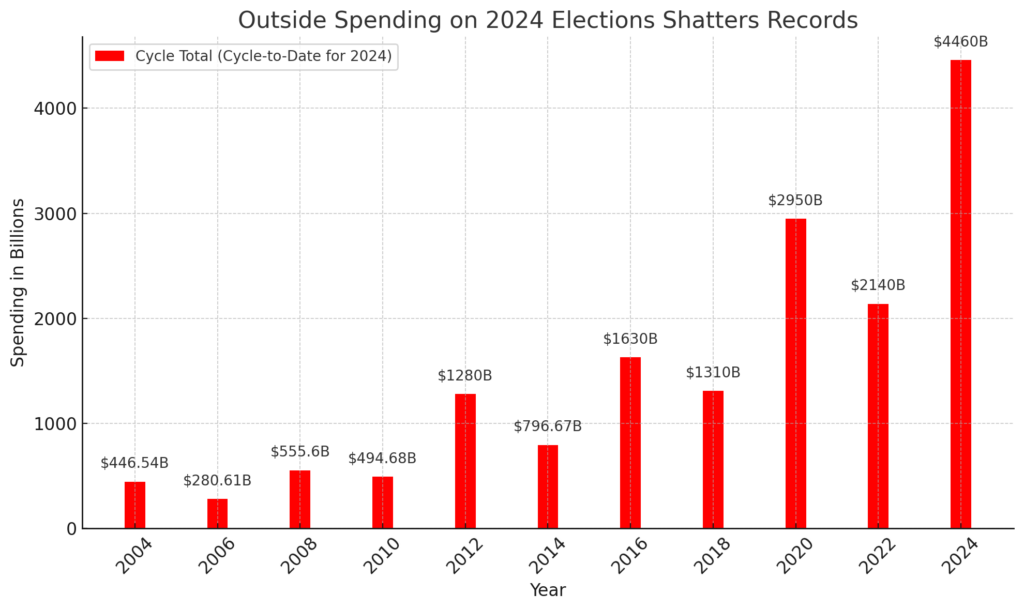
Data source: OpenSecrets
About 44% of all the money raised to support Trump came from just 10 individual megadonors, while the top 10 megadonors to support Harris only accounted for nearly 8% of her campaign and outside groups’ total contributions. The Harris campaign had a small-donor advantage, with 42% of its funds coming from small donors giving under $200 ($428.7 million) compared to the Trump campaign, whose small-dollar donations totaled less than 30% of its funds ($109.3 million).
Maine had the nation’s only campaign finance reform on the ballot this election cycle and attempts to regulate campaign spending in the post-Citizens United world. Maine voters approved the bipartisan referendum to limit donations to political action committees that spend independently in candidate elections. The initiative was carefully crafted to survive the inherent legal battles that will ensue.
In the 2024 elections, over 3 million voters backed ranked choice voting (RCV), with the measure winning in all five cities where it appeared on the ballot, including a significant 73% to 27% victory in Washington, D.C. Despite these city-level successes, statewide ballot measures to adopt RCV failed in Oregon (40.6% to 59.4%), Colorado (44.8% to 55.2%), Idaho (29.7% to 70.3%), and Nevada (45.7% to 54.3%). A measure to repeal ranked choice voting in Alaska remains undecided with absentee ballots still arriving (leading 50.8% to 49.2%), while Missouri voters passed a ban (68.5% to 31.5%). Since 2016, RCV has expanded from 10 to over 50 cities, counties, and states, now serving nearly 17 million people, signaling its growing acceptance as a tool for empowering voters and enhancing democratic outcomes.
False claims about noncitizen voting took center stage in the 2024 presidential election, and according to Issue One’s survey research, 67% of respondents reported encountering content on social media about noncitizens illegally voting in elections. Republican-majority legislatures added state constitutional amendments to clarify that only U.S. citizens can vote to state ballots in Idaho, Iowa, Kentucky, Missouri, North Carolina, Oklahoma, South Carolina, and Wisconsin. Voters in all eight states approved amendments, despite existing state and federal laws already prohibiting noncitizen voting. These initiatives contributed to amplifying false claims about noncitizens voting and undermining trust in elections.
Many experts believe that the decline in competitive elections is the result of gerrymandering, a tactic used by political actors and parties to gain advantages by drawing districts to favor their preferred outcome. Gerrymandering also makes it difficult for voters to hold politicians accountable and gives lawmakers less incentive to be responsive to the needs of their constituencies.
Ohio voters rejected a constitutional amendment (46% to 54%) that would have established a citizen-led redistricting commission to replace a system that produced seven straight sets of legislative and congressional maps found to be unconstitutionally gerrymandered to favor Republicans. Supporters of the amendment believed it failed because of how it was worded; the ballot language described the new commission as being “required to gerrymander,” even though the amendment language stated the opposite.
On the bright side this election cycle, a June 2023 ruling by the U.S. Supreme Court created a new district in Alabama where Black people make up 48.7% of the population and preserved the only other majority-Black district in the state.
Propaganda was the biggest winner in 2024. A fractured information ecosystem allowed false election information to flourish and created misinformed realities for many voters. Most prominently, American leaders spread false information that shaped voters’ views about the candidates and issues.
Russia, China, Iran, and other actors sought to interfere in the U.S. election to exploit social divisions, create chaos, and undermine faith in democratic institutions. Russia spent $10 million to infiltrate and influence far-right American media. In addition, the “Doppelganger” network spread tens of thousands of false stories and videos intended to undermine election integrity in the electorally competitive Pennsylvania, Georgia, and Arizona. China focused its attention on down-ballot races, using fake American personas and generative artificial intelligence mostly on Facebook and X, but across 50 different platforms. In addition, Russian and Iranian accounts purported to be the FBI warning of election issues and hoax bomb threats at polling places.
But it wasn’t just social media where people saw inaccurate information. According to Pew Research Center, nearly three-quarters of Americans (73%) responded that they saw inaccurate news coverage about the election at least somewhat often, including 37% who have seen this kind of information extremely or very often. Ipsos found that Americans who primarily get their news from Fox News and conservative media outlets and social media/other were more likely to answer questions about inflation and crime incorrectly relative to the broader public, while cable news/national newspaper consumers were less likely to answer questions about the level of border crossing correctly.
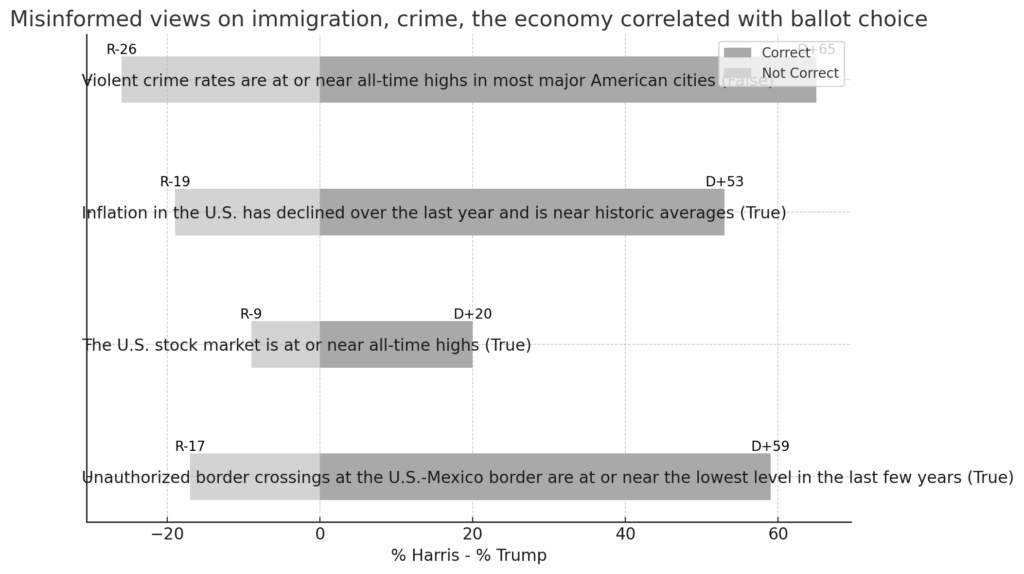
Data source: Ipsos
According to the Center for American Women and Politics at Rutgers University, there were fewer female candidates running to serve in the U.S. House of Representative or the Senate in comparison to the highs seen in the 2022 and 2020 elections. However, women achieved several historic milestones in 2024. Notably, Sarah McBride of Delaware became the first openly transgender person elected to Congress. Additionally, Angela Alsobrooks of Maryland and Lisa Blunt Rochester of Delaware were elected to the U.S. Senate, marking the first time two Black women will serve simultaneously in this chamber.

